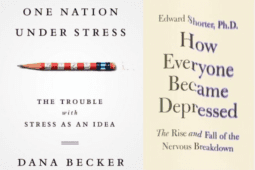Latest
The Therapist’s Most Important Tool
Salvador Minuchin on What Today's Training Approaches Are MissingTrainees today are buried beneath textbooks on theory, bombarded by lectures on current research, and taught to be experts in a variety of methods. But where... Read more
How to Help Learning Stick for Clients
What Can Neuroscience Tell Us About Psychotherapy?It’s usually easy to see when clients are tuned out or turned off, simply not absorbing what you’re trying to get across. What’s puzzling is when things... Read more
Talking on the Edge
Assessing the Risk of SuicideMost clinicians already know the basic questions to ask about a client’s suicidality, but it’s important to go beyond a rote assessment to get a fuller... Read more
Evoking the Inner Artist: September/October 2013
How to Replace Pathology with CreativityWhen clients feel blocked, therapists can help them tap their inner artist and view feelings of vulnerability, doubt, and fear as part of a creative... Read more
Wearing Your Heart on Your Face
The Polyvagal Circuit in the Consulting RoomPsychophysiologist Stephen Porges’s research on the polyvagal nervous system provides insight into the evolutionary roots of trauma and anxiety, and how... Read more
The Pathologizing of Everyday Life
When Did Sadness Become a Disease?The increasingly blurry distinction between normal and abnormal not only makes us easy targets for Big Pharma’s advertising, but also distracts us from the... Read more
More More Time
Discovering the Endless PresentA new retiree discovers the elusive secret of the endless present. Read more
You’re Never Too Old to Change
Michael Gelb On The Most Effective Methods Of ChangeMichael Gelb discusses time-tested wisdom that helps people change their lives. Read more
Finding the Missing Link to Chronic Pain
Maggie Phillips On The Levels Of Unreleased TraumaMaggie Phillips describes how attachment issues can play a big part in unreleased trauma. Read more
Editor's Note: September/October 2013
Keeping Private Practice AliveIf we wish to stay professionally alive, it’s time we recognize that the idea that we must choose between being dedicated clinicians and being smart business... Read more
Teaching Neuroscience to Our Clients
How One Client Effectively Applied Dan Siegel’s Neurobiology LessonPsychotherapy Networker Founder Rich Simon listens to Dan Siegel about neuron "sponges," empathy, and how it all impacts depression. Read more
Breathing To Balance The Stress Response System
Learn How To Use Breath Work To Alleviate AnxietyWatch Richard Brown and Patricia Gerbarg demonstrate a therapeutic breathing exercise used to treat anxiety in session. Read more
Is Sexual Orientation Hardwired In Our Brain?
Louann Brizendine On How Sexual Preference Is DeterminedPsychotherapy Networker Founder Rich Simon asks neurobiologist Louann Brizendine about sexual orientation and the brain Read more
Bringing Stressed Clients Into The Present Moment
Elisha Goldstein On The “Mindful Check-In”Psychotherapy Networker Founder Rich Simon talks with Elisha Goldstein on the meditative technique he calls a "mindful check-in." Read more
Becoming a Part of the Child Client’s Story
Dan Hughes on the Effectiveness of Psychological Hand-HoldingDaniel Hughes has many techniques to suggest when working with troubled children who have put up a wall. Read more
How the Brain’s Negativity Bias Impedes Change
Rick Hanson On Understanding Why We Focus On The NegativePsychotherapy Networker Founder Rich Simon talks to Rick Hanson about negativity bias and how it can be one of the biggest challenges to helping clients... Read more
How Addressing Nutrition Makes Talk Therapy More Effective
Leslie Korn On Nutrition’s Leading Role In Optimal Mental HealthSince psychotherapists are not routinely trained to factor in the role of nutrition, Leslie Korn’s focus on why and how to incorporate nutritional... Read more
How Attachment Issues Undermine True Intimacy
Sue Johnson On Identifying And Healing The Wounds Of AttachmentSue Johnson shares how EFT helps couples get and stay closer. Read more
James Gordon shares a technique he uses with clients to help them get out of hopeless thought patterns. Read more
Bringing The Mental Health Benefits Of Yoga To Your Clinical Practice
Amy Weintraub Demonstrates How Easily It’s DoneAmy Weintraub shares a quick 3-minute tutorial on how to breathe to calm the stress response system. Read more
Editor's Note: July/August 2013
The In-Session Breakthrough FantasyAs a growing body of research shows, deep change doesn’t come when clients just talk about their problems: it results from the impact of an emotionally... Read more
Creating Adventure And Play In Therapy
How to Vitalize Your Therapeutic StyleThe more we learn about the emotional brain, the clearer it becomes: to have real therapeutic impact, we need to create experiences that help clients learn to... Read more
Challenging The Narcissist
How to Find Pathways to EmpathyGiven their arrogance, condescension, and lack of empathy, narcissists are notoriously difficult clients. The key to working with them is being direct and... Read more
Yoga in the Therapy Room
Centering the Uncentered ClientRecently, therapists have begun to use simple, no-mat yoga practices to help clients whose minds are racing or fogged. Read more
The Taste Bud Conspiracy
Are we the victims of the food industry?A new book exposes the story of the corporate competition for our taste buds and ever-expanding tummies. Read more
Unless DSM more firmly joins the march toward biological psychiatry, it’s going to be left behind by NIMH. Read more
Therapy Isn't Brain Science
Knowledge Doesn’t Replace Clinical SkillTherapists were doing helpful work long before neuroscience made its official debut and the field developed a collective case of “brain fever.” In fact, at... Read more
Currently, there are between 100 and 150 smartphone apps designed to supplement—and occasionally even replace—face-to-face psychotherapy. In fact, the... Read more
Life After Betrayal
Getting Past the Victim IdentityWhen working with clients who’ve experienced an intimate betrayal, it’s important to empower them to move beyond a victim identity. Read more
Talking with God
Religion as a Therapeutic ExperienceAnthropologist and author Tanya Luhrmann explains how many evangelicals experience the kind of support in their connection with God that others find in their... Read more



























